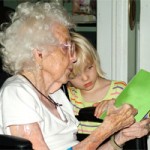For Valentine’s day, I have been thinking of a question that comes up when I talk about my book 30 Lessons for Living: Was romance and marriage different for the elders I interviewed, or was it the same? And to that I answer: “It was the same – except where it was different.” The elders experienced the same anxiety – “Will I ever find someone to love?” – young people today go through. The were nervous before first dates, and they wondered if their relationships would last.
Living: Was romance and marriage different for the elders I interviewed, or was it the same? And to that I answer: “It was the same – except where it was different.” The elders experienced the same anxiety – “Will I ever find someone to love?” – young people today go through. The were nervous before first dates, and they wondered if their relationships would last.
But they also remember a time of old-fashioned romance, where there was an element of surprise, mystery, and sometimes sacrifice involved in finding a mate. This week, I’d like to share a few stories about how the Legacy Project elders met their life partners. I hope you enjoy them as much as I have!
Jane Scripps has lived what she sums up as “a good life.” Raised in the south, as a young woman she got a job in the PX on a local army base, where she met Will in 1943.
We were in our twenties. He was a first lieutenant. Well, he was terrific. I fell in love really quick.
It happened like this. I had to go to the warehouse to check on some things. And he and the troops he was in charge of were just passing by when I was walking on the platform of the warehouse. They were on the base for two weeks for training because they were going to go overseas really soon. And I heard him say to his men, “Eyes right!” Of course I did not respond. I knew there were a group of soldiers looking at me and I was way up on the platform with high heels on. And I was a little shy about that! But then he took his men off to where he was supposed to. I found out that he spent his afternoons looking for me. And finally we met at the PX which was on that same building. And we talked for a while. He asked me for a date.
I didn’t give him a date, not right away, but I said I would give him my phone number. “And if you call me Tuesday between six and six thirty, I will consider it.” He did, and I gave him a date and we had a great time. We double-dated. We had a wonderful time and from there on we were together. I don’t mean we were together, like they mean today – No! But we had dates for four weeks, then he was going to go to another base. We still corresponded and in four weeks he asked me to marry him, and two weeks later we were married.
I had only known him for eight weeks when we married. And then we were married for six weeks, then he went overseas. He was over there during the war for fifteen months, and when he could he wrote to me every night. We’ve been married for fifty-eight years, and so it did work. It wasn’t always perfect, of course. I don’t think it ever is, but we’ve always loved each other, and did the best we can, and were faithful, and we worked through whatever we had to work through.
When asked for her thoughts on what makes a successful long-term marriage, Jane pointed to commitment, and to a belief that the institution of marriage is important in and of itself. As she put it:
Be committed to it. Because there are lots of people in my age group that were committed. And marriage was marriage and family. And they stayed together. We never ever talked about divorce or separation or anything in my marriage. It wasn’t perfect, of course. I don’t think it ever is, but we loved each other and we worked through whatever we had to work through. I guess I didn’t have a big problem that we couldn’t discuss and get over in a day. So be committed to it.









